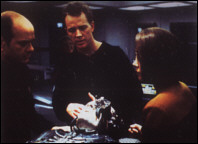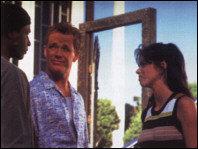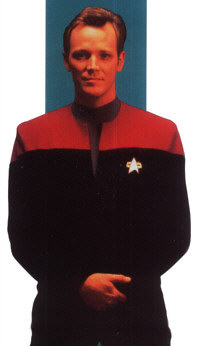Robert
Duncan McNeill: The Lessons of Lt. Tom Paris
by Deborah Fisher
At the age of 13, Robert Duncan McNeill's
first acting job provided not only the seminal experience in his professional
life, but locked in a few life lessons that have successfully carried him
into his starring role of Lt. Tom Paris on Star Trek: Voyager. Born in
North Carolina, McNeill compares his family's frequent moves because of
his father's job in early computer mainframes to the life of an army brat.
"We moved to Atlanta when I was 13,"
recalls McNeill, "and we didn't know anybody. My younger sister was taking
ballet at the local performing arts center and my mom was looking for a
way for me to meet other kids. They were doing the Wizard of Oz and they
needed 100 munchkins. They had auditions and pretty much took anybody that
showed up! I remember the day we went, I kind of freaked out because I
had never performed before. My mom was never a stage mom, but she did tell
me that I had made a commitment and while I didn't have to do the play,
I had to keep the appointment for the audition." When the kid playing Uncle
Henry dropped out, McNeill's part was upgraded and he found himself, at
age 13, playing a gray-haired old man. The hook was set.
 McNeill's
life revolved around the theater all the way through high school and propelled
him into an early graduation to take a part in a professional show. At
17, without hesitation, he left for New York. "I went to go to college,"
says McNeill, "but I really went to New York to be in the theater. I got
the very first job I auditioned for and thought 'boy, I love New York,
this is great!'" Starting with The Fantasticks, McNeill pursued roles in
musicals, visualizing a long career on Broadway. Television and a life
in Los Angeles were never in the picture for the young actor. But after
several years in New York, McNeill began to understand the limitations
of musical theater. He decided to broaden his background with more classical
training and auditioned successfully for a place in The Julliard School.
McNeill's
life revolved around the theater all the way through high school and propelled
him into an early graduation to take a part in a professional show. At
17, without hesitation, he left for New York. "I went to go to college,"
says McNeill, "but I really went to New York to be in the theater. I got
the very first job I auditioned for and thought 'boy, I love New York,
this is great!'" Starting with The Fantasticks, McNeill pursued roles in
musicals, visualizing a long career on Broadway. Television and a life
in Los Angeles were never in the picture for the young actor. But after
several years in New York, McNeill began to understand the limitations
of musical theater. He decided to broaden his background with more classical
training and auditioned successfully for a place in The Julliard School.
"I was 20 years old and I had no
cares at that point," says McNeill. "It was a really great laboratory and
I still have good friends from there." But life at Julliard had its own
limitations for a struggling actor as well. "I ran out of money. I was
working weekends at a coffee shop and taking food home so I could eat during
the week. It's not a sad story, but it was a hard time. If you were supporting
yourself through Julliard, it was a full-time commitment."
The next step on McNeill's path is
one many actors have taken - he landed a role in a soap opera, playing
Charlie Brent in ABC's All My Children. "They showed me the contract that
said I could go from stealing food from the coffee shop to eating at very
nice restaurants. It was a no-brainer." But it wasn't so simple, recalled
McNeill, who gleaned another important life lesson from his egress from
Julliard. Seeking a blessing from Michael Langon at Julliard, McNeill was
instead presented with a difficult choice. "I went in there begging for
money. I wanted him to pay me to go to school or help pay my rent and I'd
turn down the soap. Instead, he made it an artistic choice, whether I wanted
to be a real actor or not. I didn't react very nicely to that."
Determined to live up to his own
standards, McNeill took his earnings from All My Children and began mounting
his own plays. Originally intending to return to school after leaving the
soap, McNeill found that he wanted to do theater, not just study it. Eventually
he landed a starring role in the national touring production of Stephen
Sondheim's Broadway musical Into the Woods, and later, went on to appear
in Six Degrees of Separation as Rick, the play's pivotal character.
 McNeill's
eyes finally turned toward the west coast when his daughter was born six
years ago. "I decided not to raise a family in New York," says McNeill,
now the father of daughter Taylor and son Kyle. "And there's just a lot
more work out here. It seemed the easiest way to have security as an actor."
Security is relative, however, and McNeill did what all aspiring actors
do in Los Angeles - shop for a good role in a successful television series.
Roles came and went in Going to Extremes, Homefront and a sitcom called
Second Chances. He continued to work in theater also, picking up a DramaLogue
Award as Best Actor in the Ford Theater production of Romeo and Juliet.
McNeill's
eyes finally turned toward the west coast when his daughter was born six
years ago. "I decided not to raise a family in New York," says McNeill,
now the father of daughter Taylor and son Kyle. "And there's just a lot
more work out here. It seemed the easiest way to have security as an actor."
Security is relative, however, and McNeill did what all aspiring actors
do in Los Angeles - shop for a good role in a successful television series.
Roles came and went in Going to Extremes, Homefront and a sitcom called
Second Chances. He continued to work in theater also, picking up a DramaLogue
Award as Best Actor in the Ford Theater production of Romeo and Juliet.
While waiting for another pilot to
begin production in 1992, McNeill found himself with a little time on his
hands. "My agent called and said there's this part on Star Trek: The Next
Generation and everybody says it's really fun to do. Honestly, I didn't
want to do it, but I said o.k., it'll help pass the time."
The part, of course, was Nick Locarno
in TNG's fifth season The First Duty. "I really bonded with Wil Wheaton
and the other young actors in that episode," recalls McNeill fondly. "And
I had so much fun doing it, I was really sad to see that episode end."
While in New York gearing up for another play in 1994, McNeill received
a request to go in and video a couple of scenes for another Star Trek project.
He thought it was reprise of Locarno for another guest shot. "I went into
the casting director's office. It was a Friday and he said 'so, you really
think you could commit to this kind of thing?' I had no idea it was a series
and quite honestly, I hadn't prepared the work. So I said, 'you know what?
Can I come back Monday?' They had given me some scenes from the Voyager
pilot and I went home that weekend and really studied hard. I really wanted
to do something like this."
The good news, of course, was that
the producers were extremely interested. The bad news was that McNeill
didn't feel he could walk away from his commitment to the New York play.
"It was a very odd decision because I was so broke, I needed the series,
but they wanted to fly me out for the Voyager audition with the studio
at a time that would have put the play in jeopardy. I called the producers
and said I was very interested but they'd have to wait a few weeks. It
was really scary."
What McNeill would later learn was
that Voyager's creators, Rick Berman, Michael Piller and Jeri Taylor, wanted
him all along for Tom Paris to play many of the same edgy qualities that
he had brought to Nick Locarno; only this time, the character would be
redeemable. "Locarno seemed like a nice guy, but deep down he was a bad
guy," says McNeill. "Tom Paris is an opposite premise in a way. Deep down
he's a good guy. He's just made some mistakes." Cast as a Starfleet lieutenant
with a past, McNeill bit into the role of a tortured Tom Paris and has
relished every moment despite the fact that the progress of the character
has not always lived up to his juicy backstory. "Sometimes its hard to
play the juicy sides," says McNeill. "As a series regular, you have to
be careful not to offend too many people. You want the broadest audience
to like this character, so you tend to pick up the broadest likeable thing
and throw out some of the things that might offend people. In the beginning,
Paris was a ladies man and that didn't seem to be popular with a lot of
the audience. They've gotten away from that, but he is a romantic lead
and I think it's a mistake if they don't allow that part of this character
to really come out."
Entangling Paris romantically with
Kes, however, was also a misfire as the show's writers have struggled to
find a clear through line for Tom Paris. Executive Producer Jeri Taylor
feels that they finally hit a stride for Paris in Voyager's third season.
"We've been most happy with warming up Tom and B'Elanna," says Taylor.
"They have a burgeoning relationship to play off. They're actually more
alike than either of them care to admit. They're good at pointing the finger
at each other, but not as good at looking inward. Next year, they'll help
each other look within. Tom will realize he's been carrying deadly demons
about his father. We want to get underneath that."
"I feel that one of the nice things
for my character," says McNeill, "is that he tends to fit in with a lot
of different people. There are nine regulars on the show and so all the
stories can't be focused on me, but I feel every year the writers try to
use me with other people and build relationships. That's worked well. I've
had wonderful scenes with The Doctor. Neelix and I got to have a baby in
the first season in "Parturition." Harry Kim and I have a classic relationship.
I think "Blood Fever" when B'Elanna undergoes Pon Farr was really good."
McNeill relishes the strength of
the ensemble which is known for having clicked smartly into place once
Kate Mulgrew stepped onto the set. "Everybody's funny and very charming.
There's a lot of wit. We especially have a lot of fun on the bridge. It's
Kate and the boys, like locker room talk with your sister there. We watch
it - but not too much."
McNeill had long wanted to direct
and was the first member of Voyager's cast to get the shot. Set-side chat
compares him to Jonathan Frakes and it was Frakes' commitment to directing
First Contact that opened up McNeill's first directing opportunity in Voyager's
second season. "I was thrilled to get "Sacred Ground" because it was an
actor's show," says McNeill. Featuring Captain Janeway's ritual pursuit
to rescue Kes, the episode gave director McNeill a chance to exploit the
strengths of his own style. "Jonathan is much more extroverted. He has
a great mastery of the room. I'm more introverted. I do better one-on-one.
I love to go talk with each actor."
McNeill put this to especially good
use when directing Robert Beltran in the third season's Borg episode, "Unity,"
in which Chakotay is used in an entirely new way by the collective. Beside
exercising the director's prerogative to stage some good, old-fashioned
action, McNeill coached Beltran on what he believes are the real guts of
any good sci-fi story - the human emotions. "I told Robert that a real
powerful image for me was that he was being seduced by the devil. The Borg
woman is beautiful and sweet and sincere, but deep down, she's the devil.
It was great when he got that."
 For
McNeill, the unintended path from theater to television is grounded in
that first flush of realization that emerged back in Atlanta at age 13.
"Even at that age," says McNeill, "I realized the power of that connection
with other actors, performers. I don't want to get all "new-agey" about
it, but it was a kind of spiritual connection for me. There's something
magical about seeing an actor's live performance that will never be seen
again once that curtain goes down.
For
McNeill, the unintended path from theater to television is grounded in
that first flush of realization that emerged back in Atlanta at age 13.
"Even at that age," says McNeill, "I realized the power of that connection
with other actors, performers. I don't want to get all "new-agey" about
it, but it was a kind of spiritual connection for me. There's something
magical about seeing an actor's live performance that will never be seen
again once that curtain goes down.
"Star Trek, in a way, is like Shakespeare.
We say what we mean. One of the things that makes Tom Paris unique is that
he uses plain English when everyone else is talking technobabble. He cuts
to the chase. He's a red-blooded, all-American kind of guy. I like that."